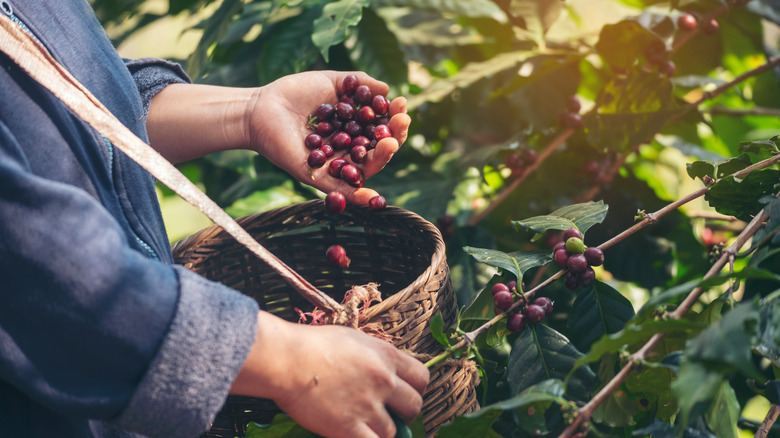Why Importing Is Essential To The Coffee Industry
Coffee is well-beloved because of its intensely satisfying caffeine boost, the seasonal comfort it brings us with flavors like peppermint mocha and pumpkin spice, and the social aspect it has in global culture. Coffee is showcased and celebrated in TV shows, movies, novels, TikToks, Instagram posts, music videos, and advertisements.
It feels safe to say that coffee is almost a way of life in the modern world, yet despite how in love we are with this energizing beverage, most of the general public probably couldn't tell you that coffee is grown on trees, or that the beans are actually encased in cherries, or that coffee originated in Ethiopia (via National Coffee Association).
In the simplest of terms Coffee Bean Corral could describe, coffee is made by harvesting the beans' cherries and having their pulp removed. They are fermented to break down the sugar and produce the necessary acids, and finally dried and then stored until it is time to mill them clean and distribute them. The beans are then roasted and ground to give us a delicious and complex cup of Joe.
The issue for many countries is that even though they consume tons of coffee every year, they can't grow the beans themselves. Therefore, they must rely on importing their coffee from select countries.
Where is coffee grown?
Coffee is a particular plant. It doesn't like to grow outside of healthy tropical climates. Climate calls this optimal growing climate the "Coffee Belt", which is a strip of area running along the equator into parts of North, Central, and South America, the Caribbean, Africa, the Middle East, and Asia.
The British Broadcasting Corporation reports that coffee is vital for the economies of Brazil, Vietnam, and Colombia which are the largest producers to date. The biggest importers are the United States, Germany, and France.
These tropical counties grow, process, and sell the world's supply of coffee to those of us who live outside of the "Coffee Belt" and rely primarily on them for our daily fix. Climate is why countries too far north or south of the equator must import their coffee. They physically cannot grow coffee trees outside of particular tropical zones.
The only places in the United States that can successfully produce coffee are Hawaii and California and do not make enough to supply the whole of the country's coffee consumption. Luckily, countries like Colombia are relatively close to the U.S. and we can import from them easily (via Those Coffee People).

